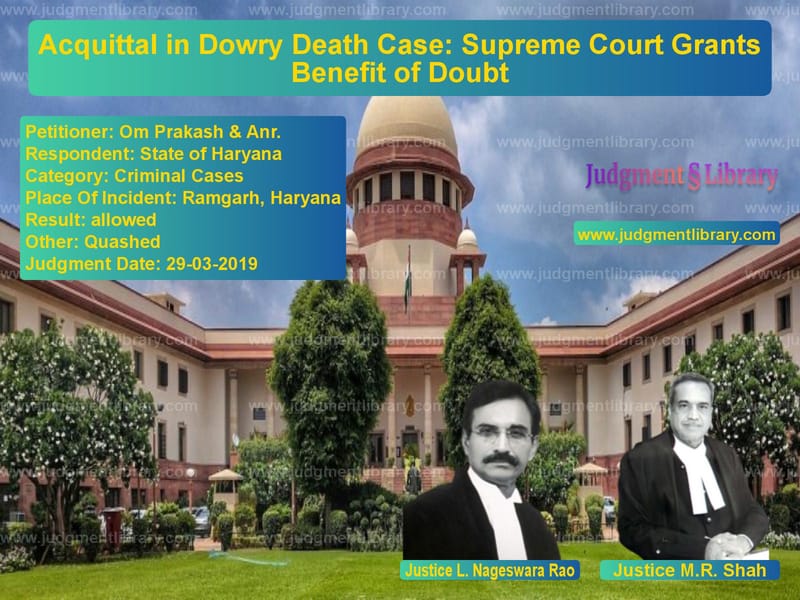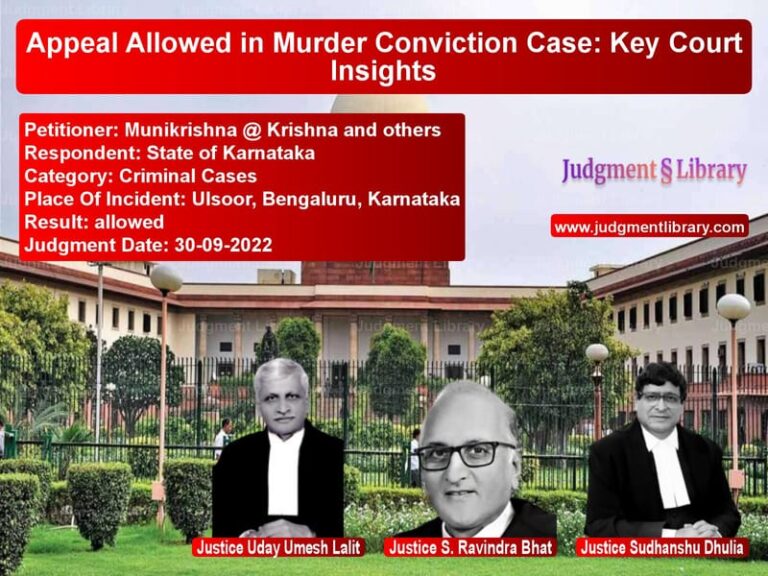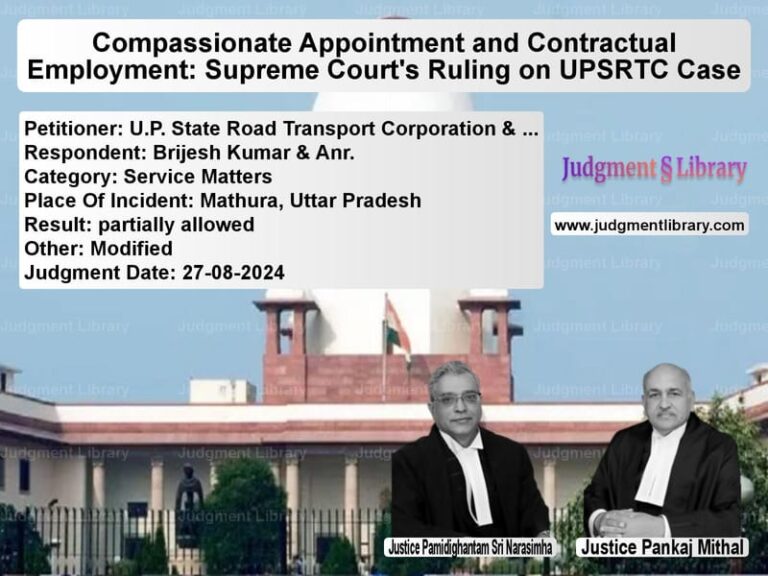Acquittal in Dowry Death Case: Supreme Court Grants Benefit of Doubt
The Supreme Court of India recently delivered a significant judgment in the case of Om Prakash & Anr. vs. State of Haryana, which dealt with charges under dowry-related offenses and destruction of evidence. The case revolved around the unnatural death of Kamla, who was allegedly subjected to dowry harassment and whose body was cremated hurriedly before her family could arrive. This judgment is crucial in understanding the evidentiary standards required to convict accused persons under Sections 304B and 201 of the Indian Penal Code (IPC).
Background of the Case
The case was initiated following an FIR lodged by Nain Singh (PW-1) against the appellants under Sections 498A, 304B, 201, and 34 of the IPC. The FIR stated that:
- Kamla was married to Shyam Sunder (son of Jodh Raj, one of the appellants) on April 19, 1992.
- She was subjected to continuous harassment for not bringing sufficient dowry.
- She resisted the demands, but at the instigation of the appellants, Shyam Sunder physically assaulted her.
- On March 13, 1997, Kamla’s family was informed that she had died the previous night.
- By the time her family reached the village, her body had already been cremated, and the ashes were allegedly thrown into the Yamuna River.
Based on these allegations, the police charged Shyam Sunder and the appellants under Sections 304B (dowry death) and 201 (destruction of evidence) IPC.
Trial Court Judgment
After conducting a thorough examination of the evidence, the Trial Court delivered the following findings:
- It accepted the prosecution’s case that Kamla’s death was unnatural.
- It found that Shyam Sunder had indeed harassed Kamla for dowry and physically assaulted her.
- The evidence against the appellants regarding instigating Shyam Sunder was deemed unreliable.
- The prosecution could not establish that the appellants directly participated in dowry harassment.
- However, the Trial Court convicted the appellants under Section 201 IPC (destruction of evidence) for allegedly cremating Kamla’s body in haste.
The court sentenced:
- Shyam Sunder to seven years rigorous imprisonment under Section 304B IPC.
- The appellants to one year rigorous imprisonment under Section 201 IPC, along with a fine of Rs.1,000 each.
High Court Ruling
The accused, including Shyam Sunder and the appellants, filed an appeal before the Punjab and Haryana High Court. The High Court:
- Upheld Shyam Sunder’s conviction under Section 304B IPC.
- Confirmed the appellants’ conviction under Section 201 IPC, stating that “the cremation of Kamla’s body could not have taken place without their active connivance.”
While dismissing the appeal of the appellants, the High Court observed that the accused’s role in destroying evidence was sufficiently established.
Appeal Before the Supreme Court
The appellants, dissatisfied with their conviction, approached the Supreme Court.
Arguments by the Appellants
The appellants contended:
- They had no role in the alleged dowry harassment.
- Their conviction under Section 201 IPC was based on mere assumptions rather than concrete evidence.
- The prosecution had failed to produce any direct evidence proving their involvement in destroying Kamla’s body.
Arguments by the State
The prosecution, representing the State of Haryana, argued:
- The hurried cremation of Kamla’s body indicated an attempt to destroy evidence.
- The appellants were part of the family and must have participated in the cremation.
- Even though no direct evidence was available, the circumstances pointed toward their involvement.
Supreme Court’s Observations
After reviewing the evidence, the Supreme Court made the following key observations:
- PW-1 (Nain Singh) and PW-2 (Attar Singh) provided inconsistent testimonies.
- There was no direct evidence linking the appellants to the cremation.
- The Trial Court itself did not find the appellants guilty under Section 304B IPC.
- The prosecution’s case relied heavily on assumptions and lacked conclusive proof.
- The High Court’s observation that the appellants “must have actively participated” in the cremation was based on conjecture, not evidence.
The Court held:
“A close scrutiny of the evidence of PW-1 and PW-2 does not disclose any material to implicate the Appellants in the offence under Section 201 IPC. The FIR refers to the statement of PW-1 that he believed that the Appellants and Shyam Sunder killed Kamla and cremated her. The High Court affirmed the conviction of the Appellants on an assumption that the cremation of Kamla’s body was not possible without the active connivance of the Appellants.”
The Supreme Court emphasized that criminal convictions cannot be based on assumptions or probabilities but must be proven beyond reasonable doubt.
Final Judgment
Considering the lack of conclusive evidence, the Supreme Court:
- Acquitted the appellants of all charges under Section 201 IPC.
- Set aside their conviction and sentence.
- Ordered that their bail bonds be discharged.
Conclusion
This judgment highlights the fundamental principle of criminal law that an accused person cannot be convicted on mere suspicion. The Supreme Court reinforced the necessity of concrete evidence and ruled that courts must be cautious while making assumptions regarding an accused’s involvement.
While dowry harassment remains a serious issue, this case serves as a reminder that courts must uphold the highest standards of proof before convicting individuals. The ruling ensures that justice is not only served but is also seen to be served fairly, preventing wrongful convictions based on weak or circumstantial evidence.
Petitioner Name: Om Prakash & Anr..Respondent Name: State of Haryana.Judgment By: Justice L. Nageswara Rao, Justice M.R. Shah.Place Of Incident: Ramgarh, Haryana.Judgment Date: 29-03-2019.
Don’t miss out on the full details! Download the complete judgment in PDF format below and gain valuable insights instantly!
Download Judgment: Om Prakash & Anr. vs State of Haryana Supreme Court of India Judgment Dated 29-03-2019.pdf
Direct Downlaod Judgment: Direct downlaod this Judgment
See all petitions in Dowry Cases
See all petitions in Custodial Deaths and Police Misconduct
See all petitions in Bail and Anticipatory Bail
See all petitions in Judgment by L. Nageswara Rao
See all petitions in Judgment by Mukeshkumar Rasikbhai Shah
See all petitions in allowed
See all petitions in Quashed
See all petitions in supreme court of India judgments March 2019
See all petitions in 2019 judgments
See all posts in Criminal Cases Category
See all allowed petitions in Criminal Cases Category
See all Dismissed petitions in Criminal Cases Category
See all partially allowed petitions in Criminal Cases Category







